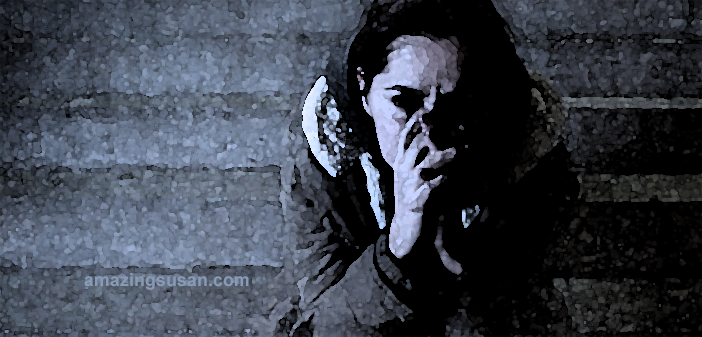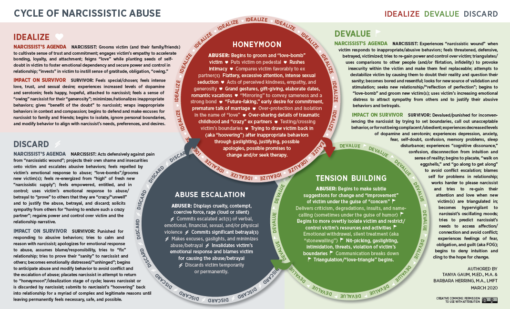the painful cycle of narcissistic abuse
I never dreamed I would find myself in an emotionally abusive relationship, especially not at the wise “old” age of sixty-four.
I have been a feminist most of my life, and I consider myself fairly knowledgeable about women’s issues, including abusive relationships. I knew the signs, surely I would recognize them if I were in such a dynamic? But no, I didn’t. At least not initially.
I was a year into an emotionally abusive relationship before I understood what was going on, and it took me months to make my way out of it. My psychological and emotional liberation is a poetic work in progress; more on that here.
Emotional abuse is insidious: subtle, gradual and harmful. It can be extremely difficult to recognize because it “creeps up” on you. I was involved with someone who is high on the narcissism spectrum, which I didn’t know until I began to notice what-felt-to-me-like unusual patterns in the ebb and flow of how we engaged with each other.
I googled narcissistic emotional abuse, and discovered I wasn’t alone in what I was experiencing.
There are dozens of articles and hundreds of YouTube videos on narcissism and narcissistic abuse. I have read and watched a slew of them. But one diagram in particular accurately and concisely captures in detail everything I lived in the year prior to my google search, and the months afterwards.
The schematic was developed by psychotherapists Tanya Gaum and Barbara Herring; you may download a .pdf here: Cycle of narcissistic abuse.
Essentially, the cycle of narcissistic emotional abuse in relationships consists of three main “stages:” idealization, devaluation and discard.
Here’s a synopsis of Gaum and Herring’s descriptors:
Idealization stage
Narcissist: grooms victim to cultivate trust and commitment; engages victim’s empathy to accelerate bonding, loyalty, and detachment; feigns “love” while planting self-doubt to foster emotional dependency and secure power and control.
Survivor: feels intense love, trust, sexual desire, and attachment to narcissist; wraps inappropriate behaviors in context and compassion; begins to ignore personal boundaries; modifies behavior to align with narcissist’s needs and desires.
Devaluation stage
Narcissist: experiences “narcissistic wound” when victim responds to inappropriate/abusive behaviors; feels threatened, defensive, betrayed, victimized; tries to regain power and control; triangulates/uses comparisons to other people (and/or flirtation, infidelity) to provoke insecurity within the victim; becomes bored and resentful; begins to “love bomb” and groom new victim(s).
Survivor: is devalued/punished for inconveniencing the narcissist by trying to set boundaries, calling out unacceptable behavior, or not being obedient; experiences depression, anxiety, fear, self-doubt, cognitive dissonance, confusion, disconnection from sense of reality; begins to placate, “walk on eggshells;” blames self for problems in relationship; becomes hyper-vigilant to narcissist’s oscillating moods.
Discard stage
Narcissist: acts defensively against pain from “narcissistic wound,” projects their own shame and insecurities onto victim and escalates abusive behaviors; feels repelled by victim’s emotional response to abuse; “love bombs”/grooms new victim(s); feels reenergized from “high” of a fresh new “narcissistic supply.”
Survivor: is punished for responding to abusive behavior; tries to reason with narcissist; apologizes for emotional response to abuse, assumes blame, tries to ”fix” relationship; begins to anticipate abuse and modify behavior to avoid escalation; placates narcissist in bid to return to idealization; leaves or is discarded by narcissist; submits to “hoovering” back into relationship.
The explanation in the .pdf expands on each of these; if you are in, or think you are in such a relationship, I encourage you to download the .pdf here. The cycle can repeat itself over months, years, decades, or even just days or weeks. Once I recognized the pattern, I saw it repeat over the arc of our relationship, as well as during short timeframes within it.
I think it’s important to recognize that any relationship is a dynamic in which two or more people participate; sometimes the dynamic impacts whole families. Everyone in the dynamic needs to change their behaviour to stop the negative impacts on all involved.
Extricating oneself or changing behaviours is not easy. If you are involved in such a relationship, please seek professional help.
© 2020 Susan Macaulay. I invite you to share my poetry and posts widely, but please do not reprint, reblog or copy and paste them in their entirety without my permission. Thank you.

